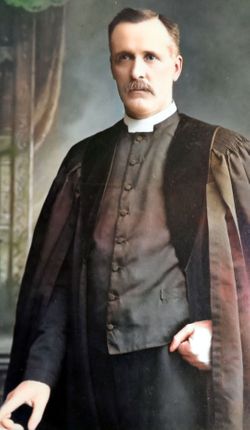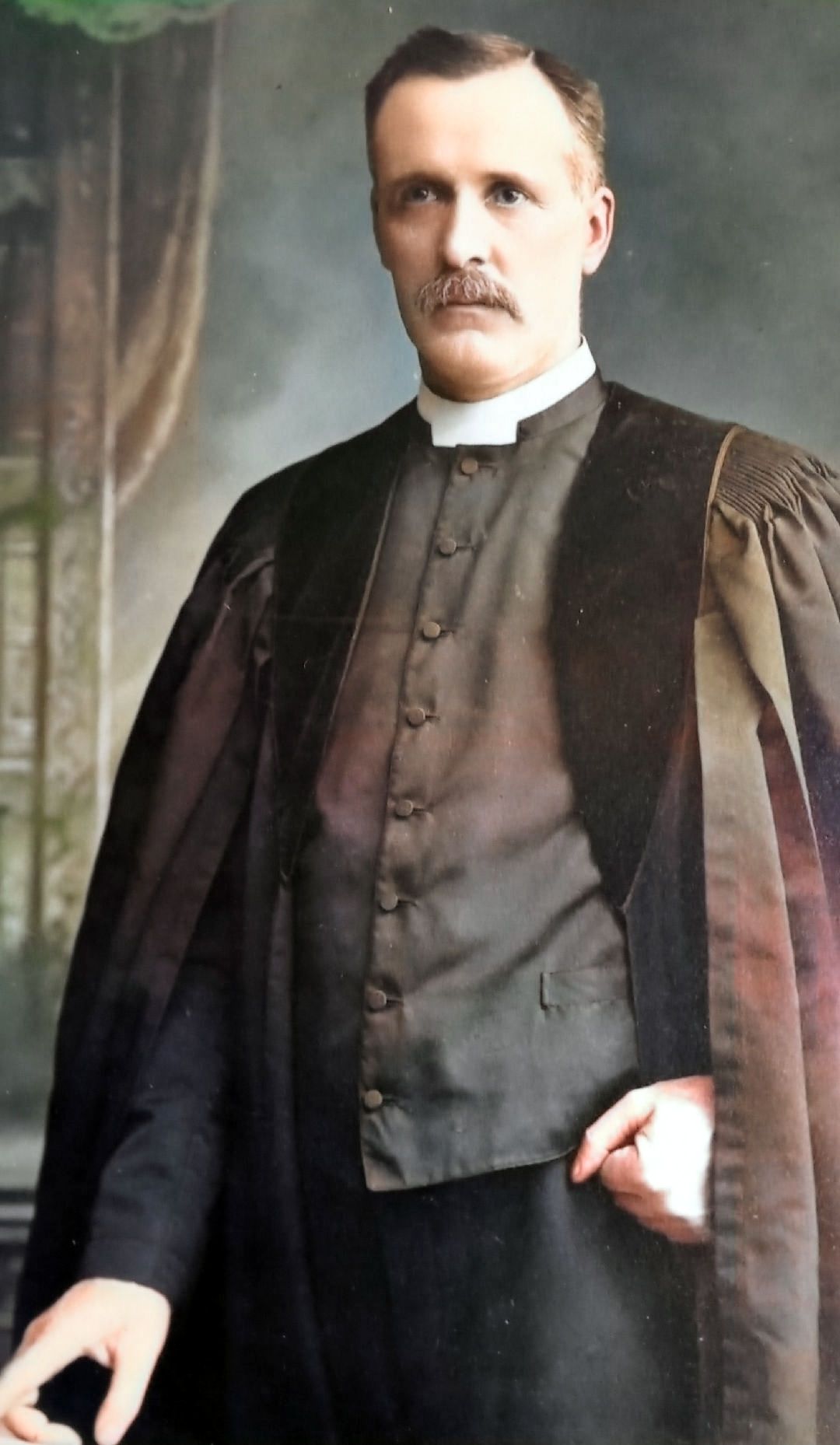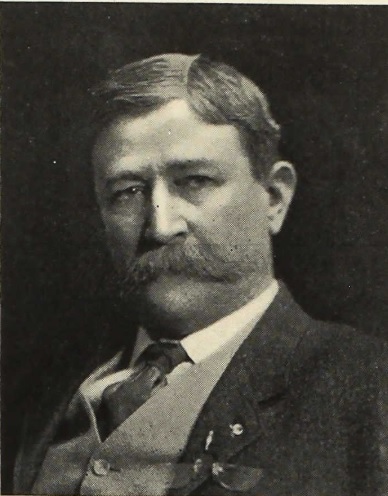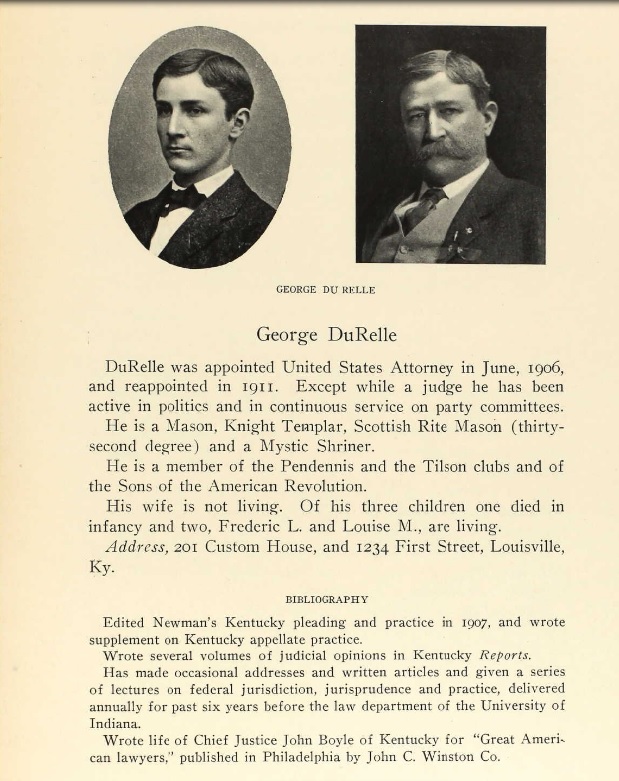A HISTORY OF KENTUCKY AND KENTUCKIANS By E. POLK JOHNSON 1912 The Lewis Publishing Company
GEORGE DU RELLE – A distinguished representative of the bench of Kentucky is Judge George DuRelle, who has served on the bench of the Court of Appeals of Kentucky, and who is now incumbent of the office of United States district attorney for the Western district of Kentucky. He has long held a position of prominence as a member of the bar of the city of Louisville, which has been his home from his boyhood days, and which has been the scene of his admirable work in his profession and in offices of distinguished public trust and responsibility.
Judge DuRelle was born in the village of York, Livingston county, New York, on the 18th of October, 1852. He is a son of Dr. George O.J. and Frances Mary (Pierce) DuRelle, and both families were founded in New England in the early Colonial epoch of our national history. The Pierce family is of English origin and early became one of prominence and influence in New England. Captain John Whiting, an ancestor of Judge DuRelle on the maternal side, was an officer in the Continental line during the war of the Revolution, and other ancestors of distinction were John Haynes, who was the first governor of Connecticut, and William Pitkin, who was appointed in 1664 attorney general for the colony of Connecticut. The latter's son William was chief justice of the Supreme Court of Connecticut. Martha, the sister of William Pitkin the first, married into the Wolcott family, which has been one of distinction in connection with the annals of American history. Colonel Joseph Pitkin, of the third generation, was a member of the Crown Point expedition. Other representatives of this family were Captain Richard Pitkin, who was a soldier in the war of the Revolution; Hon. William Pitkin, who served as chief justice, lieutenant governor and later as Governor of Connecticut; and Eleazur Pitkin, who served as high sheriff of Hartford county, Connecticut.
Dr. George O.J. DuRelle was a native of New Hampshire and was a man of fine intellectual and professional attainments. He attended both Bowdoin and Dartmouth Colleges, in the latter of which he completed a course in medicine and surgery and in which he graduated as a member of the class of 1838, with the degree of Doctor of Medicine. He soon afterward established his home in Livingston county, New York, where he gained marked distinction in the work of his profession and where he continued to reside until his death, in 1853, at which time he was but forty years of age. Judge DuRelle's mother was born in Livingston county, New York, in 1831, and had the advantage of excellent private schools in Rochester. After the death of her first husband she became the wife of Professor Samuel B. Barton, who was at one time a member of the faculty of Center College, at Danville, Kentucky, and was well known as an educator in Danville and Louisville, to which latter city he removed with his family in 1859. Professor Barton became principal of the Presbyterian Female Seminary in Louisville, and later of the Walnut Hill school, near Lexington. He passed the closing years of his life in Bullitt county, where he died in 1886, and his widow was a resident of Louisville at the time of her death which occurred in 1900.
Judge DuRelle was an infant at the time of his father's death and was a lad of seven years at the time when his mother and stepfather established their home in Louisville. Here he gained his early educational discipline under the direction of his stepfather, under whose tutorship he later continued his studies in the school at Walnut Hill. Still later he attended a school in the historic old city of Elizabeth, New Jersey, and in 1868 he graduated in the Hopkins Grammar School in New Haven, Connecticut, an institution which, with one exception, is the oldest school in the United States. In 1868 Judge DuRelle was matriculated in Yale University, as a member of the class of 1872, but at the end of his sophomore year he returned to Louisville, where for a short time he was employed in a clerical capacity. He then engaged in teaching in the Sixth ward school, and attended the law department of the University of Louisville, from which he graduated in 1874. He was then admitted to the bar and began the practice of his profession in Louisville, in the office of the late Colonel Robert W. Woolley. In 1882 he was appointed assistant United States district attorney for Kentucky, in which capacity he served until June 8, 1886, when he resigned. In 1889 he was reappointed to the same position, under the administration of President Benjamin Harrison, and served until 1891, when he again resigned.
Judge DuRelle was frequently designated to act as special master commissioner in the hearing of important corporate litigations. In the celebrated contested election case of Boyle versus Toney he appeared as counsel for the Hon. St. John Boyle. The suit resulted in the favor of Judge Sterling B. Toney, but under such circumstances that he declined the seat. Major George B. Eastin was then appointed to fill the vacancy, and at the regular election he became the Democratic candidate for the office. Judge DuRelle, whose conduct of the contested election case had won him distinction, was made the candidate of the Republican party, and Judge John D. Simrall became an independent candidate. The Republican candidate was chosen by a majority of about thirteen hundred votes over both opponents, and in 1895 he took his place upon the appellate bench.
Judge DuRelle remained on the bench of the court of appeals until 1902, and then again gave his attention to the practice of his profession, in which his prestige had been materially heightened by his services on the bench. In 1906 he was appointed to the office of United States district attorney. Judge DuRelle has been a factor in the councils of the Republican party in his state and has done much to further its cause in various campaigns. He attends the Presbyterian church, as did his wife, and he is identified with various fraternal and social organizations.
On the 3rd of June, 1886, was solemnized the marriage of Judge DuRelle to Miss Louise Leib, who was born and reared in Louisville, where her father, the late Fred Leib was for many years a prominent business man and influential citizen. Mrs. DuRelle, a woman of most gracious personality, and who held the affectionate regard of all who came within the sphere of her influence, died on the 23rd of November, 1895, and is survived by two children, Frederick L. and Louise Marie.
A HISTORY OF KENTUCKY AND KENTUCKIANS By E. POLK JOHNSON 1912 The Lewis Publishing Company
GEORGE DU RELLE – A distinguished representative of the bench of Kentucky is Judge George DuRelle, who has served on the bench of the Court of Appeals of Kentucky, and who is now incumbent of the office of United States district attorney for the Western district of Kentucky. He has long held a position of prominence as a member of the bar of the city of Louisville, which has been his home from his boyhood days, and which has been the scene of his admirable work in his profession and in offices of distinguished public trust and responsibility.
Judge DuRelle was born in the village of York, Livingston county, New York, on the 18th of October, 1852. He is a son of Dr. George O.J. and Frances Mary (Pierce) DuRelle, and both families were founded in New England in the early Colonial epoch of our national history. The Pierce family is of English origin and early became one of prominence and influence in New England. Captain John Whiting, an ancestor of Judge DuRelle on the maternal side, was an officer in the Continental line during the war of the Revolution, and other ancestors of distinction were John Haynes, who was the first governor of Connecticut, and William Pitkin, who was appointed in 1664 attorney general for the colony of Connecticut. The latter's son William was chief justice of the Supreme Court of Connecticut. Martha, the sister of William Pitkin the first, married into the Wolcott family, which has been one of distinction in connection with the annals of American history. Colonel Joseph Pitkin, of the third generation, was a member of the Crown Point expedition. Other representatives of this family were Captain Richard Pitkin, who was a soldier in the war of the Revolution; Hon. William Pitkin, who served as chief justice, lieutenant governor and later as Governor of Connecticut; and Eleazur Pitkin, who served as high sheriff of Hartford county, Connecticut.
Dr. George O.J. DuRelle was a native of New Hampshire and was a man of fine intellectual and professional attainments. He attended both Bowdoin and Dartmouth Colleges, in the latter of which he completed a course in medicine and surgery and in which he graduated as a member of the class of 1838, with the degree of Doctor of Medicine. He soon afterward established his home in Livingston county, New York, where he gained marked distinction in the work of his profession and where he continued to reside until his death, in 1853, at which time he was but forty years of age. Judge DuRelle's mother was born in Livingston county, New York, in 1831, and had the advantage of excellent private schools in Rochester. After the death of her first husband she became the wife of Professor Samuel B. Barton, who was at one time a member of the faculty of Center College, at Danville, Kentucky, and was well known as an educator in Danville and Louisville, to which latter city he removed with his family in 1859. Professor Barton became principal of the Presbyterian Female Seminary in Louisville, and later of the Walnut Hill school, near Lexington. He passed the closing years of his life in Bullitt county, where he died in 1886, and his widow was a resident of Louisville at the time of her death which occurred in 1900.
Judge DuRelle was an infant at the time of his father's death and was a lad of seven years at the time when his mother and stepfather established their home in Louisville. Here he gained his early educational discipline under the direction of his stepfather, under whose tutorship he later continued his studies in the school at Walnut Hill. Still later he attended a school in the historic old city of Elizabeth, New Jersey, and in 1868 he graduated in the Hopkins Grammar School in New Haven, Connecticut, an institution which, with one exception, is the oldest school in the United States. In 1868 Judge DuRelle was matriculated in Yale University, as a member of the class of 1872, but at the end of his sophomore year he returned to Louisville, where for a short time he was employed in a clerical capacity. He then engaged in teaching in the Sixth ward school, and attended the law department of the University of Louisville, from which he graduated in 1874. He was then admitted to the bar and began the practice of his profession in Louisville, in the office of the late Colonel Robert W. Woolley. In 1882 he was appointed assistant United States district attorney for Kentucky, in which capacity he served until June 8, 1886, when he resigned. In 1889 he was reappointed to the same position, under the administration of President Benjamin Harrison, and served until 1891, when he again resigned.
Judge DuRelle was frequently designated to act as special master commissioner in the hearing of important corporate litigations. In the celebrated contested election case of Boyle versus Toney he appeared as counsel for the Hon. St. John Boyle. The suit resulted in the favor of Judge Sterling B. Toney, but under such circumstances that he declined the seat. Major George B. Eastin was then appointed to fill the vacancy, and at the regular election he became the Democratic candidate for the office. Judge DuRelle, whose conduct of the contested election case had won him distinction, was made the candidate of the Republican party, and Judge John D. Simrall became an independent candidate. The Republican candidate was chosen by a majority of about thirteen hundred votes over both opponents, and in 1895 he took his place upon the appellate bench.
Judge DuRelle remained on the bench of the court of appeals until 1902, and then again gave his attention to the practice of his profession, in which his prestige had been materially heightened by his services on the bench. In 1906 he was appointed to the office of United States district attorney. Judge DuRelle has been a factor in the councils of the Republican party in his state and has done much to further its cause in various campaigns. He attends the Presbyterian church, as did his wife, and he is identified with various fraternal and social organizations.
On the 3rd of June, 1886, was solemnized the marriage of Judge DuRelle to Miss Louise Leib, who was born and reared in Louisville, where her father, the late Fred Leib was for many years a prominent business man and influential citizen. Mrs. DuRelle, a woman of most gracious personality, and who held the affectionate regard of all who came within the sphere of her influence, died on the 23rd of November, 1895, and is survived by two children, Frederick L. and Louise Marie.
Family Members
Sponsored by Ancestry
Advertisement
Explore more
Sponsored by Ancestry
Advertisement












